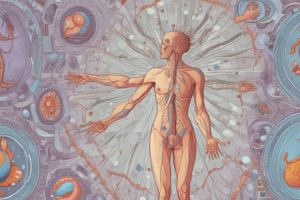Podcast
Questions and Answers
Which of the following is NOT a function of CD8+ T cells?
Which of the following is NOT a function of CD8+ T cells?
- Produce antibodies
- Recognize and respond to antigens presented by antigen-presenting cells
- Kill infected cells
- Coordinate immune responses (correct)
What is the primary function of dendritic cells?
What is the primary function of dendritic cells?
- To coordinate immune responses
- To present antigens to T cells (correct)
- To produce antibodies
- To recognize and respond to antigens
Which of the following is a characteristic of innate immunity?
Which of the following is a characteristic of innate immunity?
- Activation of immune cells through co-stimulatory signals
- Specific recognition of antigens
- Immediate protection against infections (correct)
- Development of immunological memory
What is the primary function of B cells?
What is the primary function of B cells?
Which of the following is an example of an autoimmune disorder?
Which of the following is an example of an autoimmune disorder?
What is the role of pattern recognition receptors (PRRs) in the immune response?
What is the role of pattern recognition receptors (PRRs) in the immune response?
Which of the following is NOT a type of immunity?
Which of the following is NOT a type of immunity?
What is the primary function of immunoglobulins (antibodies)?
What is the primary function of immunoglobulins (antibodies)?
Flashcards are hidden until you start studying
Study Notes
Overview of Immunology
- Study of the immune system, which protects the body against pathogens, viruses, and other foreign substances
- Immunology involves understanding the mechanisms of immune responses, including innate and adaptive immunity
Innate Immunity
- First line of defense against infections
- Non-specific defense mechanisms that provide immediate protection
- Includes physical barriers (skin, mucous membranes), cellular responses (neutrophils, macrophages), and chemical responses (inflammatory responses)
Adaptive Immunity
- Specific immune response that develops over time
- Involves activation of immune cells (T cells, B cells) that recognize and respond to specific antigens
- Includes humoral immunity (antibody-mediated) and cell-mediated immunity
Immune Cells
- T Cells (T Lymphocytes)
- Recognize and respond to antigens presented by antigen-presenting cells (APCs)
- CD4+ T cells (helper T cells) coordinate immune responses, CD8+ T cells (cytotoxic T cells) kill infected cells
- B Cells (B Lymphocytes)
- Produce antibodies to neutralize or remove pathogens
- Activated by antigen binding and T cell help
- Dendritic Cells
- APCs that present antigens to T cells
- Activate immune responses by recognizing pathogens and presenting antigens
Antibodies (Immunoglobulins)
- Produced by B cells in response to antigens
- Recognize and bind to specific antigens, marking them for destruction
- Five classes: IgA, IgD, IgE, IgG, IgM
Immune Response
- Recognition
- Antigens recognized by immune cells through pattern recognition receptors (PRRs) and antigen-presenting cells (APCs)
- Activation
- Activation of immune cells, including T cells and B cells, through co-stimulatory signals and cytokines
- Effector Response
- Elimination of pathogens through antibody-mediated and cell-mediated mechanisms
- Memory Response
- Development of immunological memory, allowing for rapid response to future infections
Immunological Disorders
- Immunodeficiency Disorders
- Weakened immune system, increasing susceptibility to infections (e.g., HIV/AIDS)
- Autoimmune Disorders
- Immune system attacks self-antigens, leading to tissue damage (e.g., rheumatoid arthritis, lupus)
- Allergies
- Overactive immune response to harmless substances, leading to inflammation and tissue damage
Overview of Immunology
- Immunology is the study of the immune system, which protects the body against pathogens, viruses, and other foreign substances
- It involves understanding the mechanisms of innate and adaptive immunity
Innate Immunity
- Provides immediate protection against infections through physical barriers, cellular responses, and chemical responses
- Includes skin and mucous membranes as physical barriers
- Cellular responses involve neutrophils and macrophages
- Inflammatory responses are a type of chemical response
Adaptive Immunity
- Develops over time and involves specific immune responses to specific antigens
- Involves activation of immune cells, including T cells and B cells
- Includes humoral immunity (antibody-mediated) and cell-mediated immunity
- T cells recognize and respond to antigens presented by antigen-presenting cells (APCs)
Immune Cells
- T Cells (T Lymphocytes)
- Recognize antigens presented by antigen-presenting cells (APCs)
- CD4+ T cells coordinate immune responses, while CD8+ T cells kill infected cells
- B Cells (B Lymphocytes)
- Produce antibodies to neutralize or remove pathogens
- Activated by antigen binding and T cell help
- Dendritic Cells
- Present antigens to T cells, activating immune responses
- Recognize pathogens and present antigens
Antibodies (Immunoglobulins)
- Produced by B cells in response to antigens
- Recognize and bind to specific antigens, marking them for destruction
- Five classes: IgA, IgD, IgE, IgG, IgM
Immune Response
- Recognition
- Antigens recognized by immune cells through pattern recognition receptors (PRRs) and antigen-presenting cells (APCs)
- Activation
- Activation of immune cells, including T cells and B cells, through co-stimulatory signals and cytokines
- Effector Response
- Elimination of pathogens through antibody-mediated and cell-mediated mechanisms
- Memory Response
- Development of immunological memory, allowing for rapid response to future infections
Immunological Disorders
- Immunodeficiency Disorders
- Weakened immune system, increasing susceptibility to infections (e.g., HIV/AIDS)
- Autoimmune Disorders
- Immune system attacks self-antigens, leading to tissue damage (e.g., rheumatoid arthritis, lupus)
- Allergies
- Overactive immune response to harmless substances, leading to inflammation and tissue damage
Studying That Suits You
Use AI to generate personalized quizzes and flashcards to suit your learning preferences.




